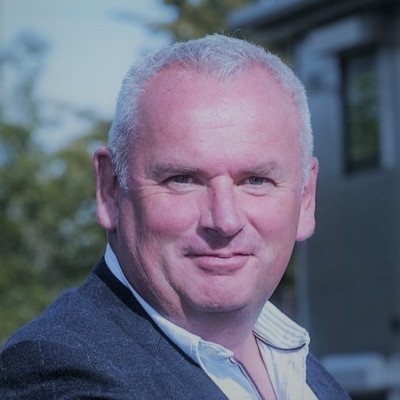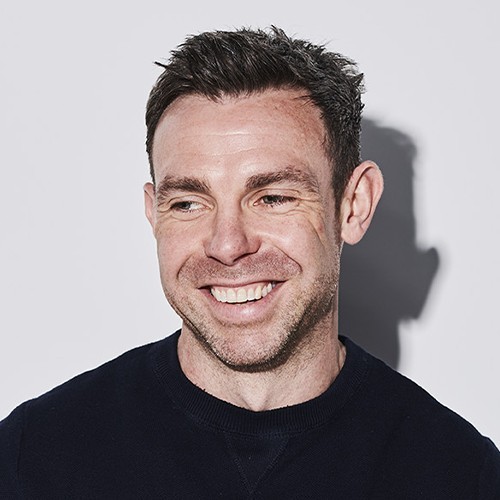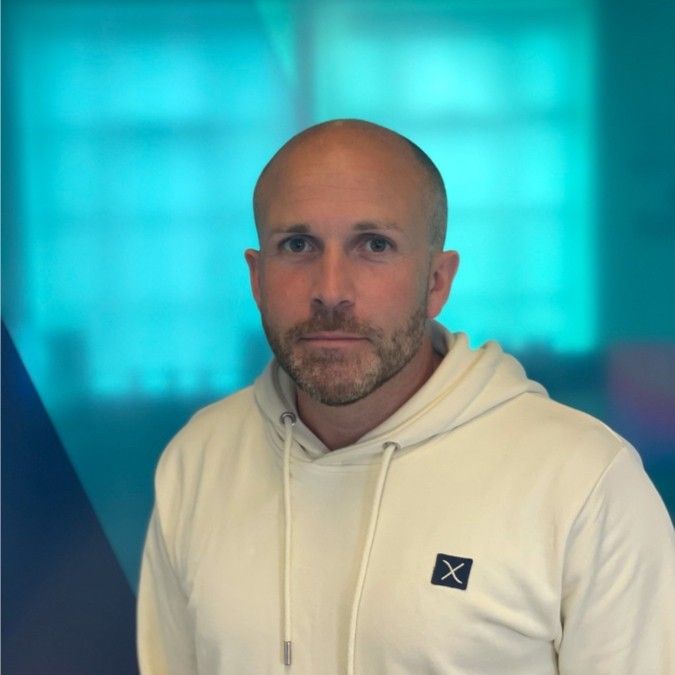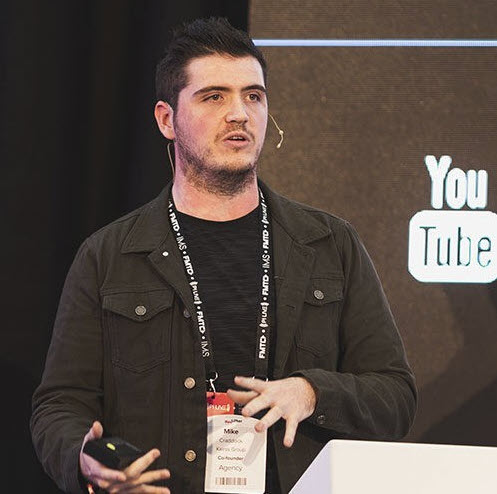0
3 things I wish I knew when I started

1) How my “Big plans” years later would seem small because we often underestimate our ability to achieve. Dream Big! When I started FABRIC I was aiming to create a job for myself that I could do for the rest of my working career that wasn’t in statutory social work. I didn’t know what an entrepreneur was I was simply trying to find a way to have a job where I was making the difference I wanted to young people in need. 6 years after we opened and I am applying for funding to create a franchise model so that young people across the UK and potentially globally can benefit from our model.
2) The power of numbers- yep the self-confessed word lover now places huge value on the power of numbers. When I started FABRIC I had a business partner who was an accountant and I left all things numbers to them. I leaned away from what I didn’t like and essentially gave all my power away. Knowing the figures in your business can be as powerful as the difference between succeeding or going insolvent. I am now the sole shareholder and director of my business, knowing the numbers enables me to answer questions confidently when applying for funding, feel strong in my day-to-day management of the business and helps me make even bigger plans! P.s get a great accountant, one you connect with and one who empowers you to understand the finances of your business. If they don’t have time to help you understand- go elsewhere!
3) That business is a rollercoaster and not just over a year, sometimes it’s daily and even hourly. Understanding and expecting this has enabled me to flow with the challenges. The business rollercoaster is challenging at times but don’t fall into the trap of feeling you need to hustle, 16hr work days don’t do anything positive for you or your business. When the rollercoaster is tough, make more time for self-care not less. Over time the peaks and troughs get less high and low and you learn to ride the wave. “The sweet ain’t so sweet without the sour”- take time to look in the rearview mirror and at what you’ve surpassed!

- That I didn’t have to wait for other people to give me permission to do things, I could give myself that permission
- That being clear about the purpose of doing something is key to being successful. How many times did I end up doing something without really knowing – or asking – why?!
- That if some things aren’t failing, then you aren’t trying enough new things. Failure is a sign that you are pushing the boundaries, that you are trying to create change in a world that really needs it. Embrace it, learn from it and keep trying new things.

1.) It’s ok to fail. In fact, it usually helps in the long run to make errors and learn from them. If you’re afraid of failure it will mean that you don’t take the risks you will need to to succeed.
2.) Plan your time around what works best for you and makes you most comfortable. Make sure you’ve allocated time in your diary for yourself and for rest, exercise, fun, sleep and guilt-free leisure time. Your environment should be built for success.
3.) Pick the best people for your organisation based on their skills and temperament rather than the job they apply for. Don’t limit yourself by turning good people away because they don’t quite fit a role. Find them a different role. Success or failure is all about the calibre of your team and the people “on the bus”.

- People Management – be kind, firm, consistent and fair to all staff. This will pay dividends in the long term
- Finance – never guess why something is not right, deep dive into finance and understand ASAP the root cause
- Celebrate success – don’t be scared to celebrate success with your team and keep all the team from cleaners to managers informed of the company performance.

1. It really is all about people because culture eats strategy for breakfast
- Having an engaged culture and employee strategy is so important. Treating people as individuals and being aware we all have different needs is vital to ensure your vision and strategy is successfully brought to life.
2. Everything takes longer than you think
- In a world of instant gratification, you must be prepared to stick at it, work harder than everyone else in your team and be consistent to achieve success. There are no quick wins or easy money.
3. Plans must be flexible because success isn’t a straight line
- A clear and structured business plan is vital for success, after all, if you don’t know where you’re going how do you know if you’ve got there? This said you must be able to adjust to changing conditions both internally and externally to ensure your plan stays relevant and can be achieved.

3 things I wish I’d known when I started in business 20 years ago:
1) “Everyone is pretending” (me included) – I’m yet to meet another business owner who isn’t pretending. If they deny it they’re lying. It’s impossible to know in advance what failures you’ll need to prepare for. But they’ll come thick and fast. Just pretend to be a boss and eventually you’ll become one. Roll with the punches and by default, you’ll be more experienced than when you started out.
2) “Aim for the stars” – Imagine how big or great your business could be, and it will start to become real the harder you work. And the more that idea manifests in your brain/speech/actions its starts to happen bit by bit. Just stay consistent. Your team will follow your enthusiasm if it’s real.
3) “Check your ego!” – Be humble and grateful to those around you. Say thank you as often as possible to those who work hard for you. Bring them with you and share the success. If you criticise someone, that’s your ego talking, not your business brain.

1. The client, is and will always be, your boss. Address/solve their problems like you would your own.
2. Never sell your own cheese. Start looking for and recruiting expert, ethical and motivated sales professionals to represent your product/service.
3. Judiciously select the right-sized law firms and financial firms to guide you in your early years. Pay now or pay more later!
The journey of a thousand miles begins with one step. It’s not if you win or lose, it’s how well you bounce.

When I started I wish I knew that you’re your only limitation – you’re not constricted to a set of skills or even an industry as long as you genuinely love learning, I’ve changed roles and careers as many times as my passion needed me to once I understood this.
I also wish I came to the realisation that I am my own brand and part of that is taking accountability for communicating my boundaries and organising my day in a way that makes me most productive irrespective of the enterprise, the policies, the process or the tone death command and control managers I encountered. As with everything in life you need to understand and appreciate your own worth before others will.
Lastly, I wish I were more prepared for facing the EQ and lack of psychological safety crisis and that I recognised earlier how much “human work resistance” there is and how much “HumanDebt” organisations had and therefore, how hard it would be to get people to start helping themselves in the workplace.

1) In order to scale, you need build your Product and your Go-to-Market in equal strengths – building a great product without good marketing execution is going to put the brakes on and delay your scale up. Having awesome marketing without a great product will create a customer churn problem.
2) Build the product and business which fits with your personal culture and aspirations, then either bootstrap or find investors which fit with your culture and way of thinking.
3) Never expect your business to scale without a recession getting in the way, always build resilience in from day one.

Teams can only truly achieved success together when based on:
1) Mutual trust
2) Respect
3) A common goal

1) Intent is more durable than vision. It will likely take much longer than you’d planned for and won’t look too similar to the ‘vision’ you have today. I know this doesn’t apply to you but imagine that it does. Are you happy to follow your intent for the next 20 years?
2) You have weaknesses, find a way to be responsible for them. Unfortunately, you can’t compensate for them with your strengths and need to find a way of delivering on them.
3) All advice is contextual. It’s useful to be able to take advice and try and see which context it emerged from and then cross-reference with your own to see if it applies.

Start by figuring out the “why” behind your business. By that I mean do you exist solely for the benefit of your shareholders, or for the benefit of your employees, your suppliers, and your local community? In my experience, organisations placing purpose on an equal footing to profit often outperform those purely focused on profit. Don’t overlook the fact that there’s a shift in customer behaviour towards companies that “do good” – which may suggest that purpose is the new competitive edge. Secondly, hire a team that unequivocally understands your purpose. Don’t be tempted to rush recruitment. Getting the right people on the bus is way more valuable than just filling it with passengers. And finally, ditch your ego and build a business that’s not dependent on you. If nothing else, you’ll be able to take that well-earned holiday and recharge your batteries without checking your phone every five minutes!

1) It seems to glaringly obvious, but cash is king. Without it you’re constantly on the back foot but with it you’re able to play on a much more level playing field.
2) Be on your guard, sadly not everyone has you or your business’s best interests at heart.
3) Just keep going, no matter how difficult things get. Remember how far you’ve come.

Over the years I have been lucky to work for some interesting characters and have learned a lot in the process. When it comes to leadership, there are many attributes but there are 3 particular aspects that I try to emulate:
1) Being principled and consistent.
2) Taking the right decisions, however difficult or unpopular.
3) Making time for everyone, inspiring them to go that extra mile. If I could have adopted these aspects earlier in my career that would have been useful, as it would make them easier to fulfil today!

Listen more. Talk less. Learn more. Spend less. Delegate more. Work less. Think more. Hurry less.

1) I hadn’t appreciated the length of time it takes to change or modify the planning system. I came up with the idea that all built development should properly account for and compensate for its impacts on biodiversity/wildlife which in November 2021 eventually became enshrined in law. It took 14 years!
2) I wish I had realised that there are so many entrenched views in the environment ‘movement’; people were unhappy to see others trying to create a profitable business from environmental improvement. This was the domain of the grant giver and taker. No wonder biodiversity in the UK has declined by 60% in the last five decades!
3) I wish I’d had a better way of working out which meetings would be productive and which were really just about being seen. I’ve spent too many hours in meetings that had limited value. We are good at talking but not so good at doing!

1) Have a plan, but don’t overcomplicate it. Having a well-defined plan will help you to stay focused and achieve the goals that you set. Simple is fine, the main thing is that you follow your plan to the letter and make it a habit.
2) People are your greatest asset. Your success will come from the people who are working with you and supporting you, not just your ideas and skills. The right team members will accelerate your growth.
3) Join a peer group. Startups are lonely and isolating places, especially if you don’t have anyone to talk to. A peer group will help you to develop your network, learn and grow.

1) It’s not what you know – it’s what you get done that determines your success.
2) Getting and keeping customers is the most important thing in business – by miles… (when you have a rhythmic flow of enough customers every other challenge is sortable)
3) And therefore setting time aside EVERY day to do work that gets and keep customers is the only sane sensible thing for any business owner to do.

1)Surround your self by really good people – people with better, different and wider skills than you!
2) Never be afraid to ask questions or for help.
3) If you’re not happy change it. Be confident in yourself and your self worth.
4) Try and find different mentors throughout your career.

1) Unless you love managing people, or have an interest in improving in that area, don’t even try. Get someone in to do that side of the business so you can focus on what you’re good at; eg product, fundraising, whatever…
2) It is much better to have engaged shareholders who understand your business. ‘Dumb’ money genuinely isn’t that useful.
3) Above all, remember that the main thing is that the main thing is the main thing. Diversify too early at your detriment!

1) Work with like-minded people, not like-skilled people. The closer you work with someone, the more your values need to be aligned. But if you are to grow an effective team, you need people with skills that compliment yours.
2) Have fun. Life is precious and short. You’ll spend a lot of time at work. Build and protect an ethos of kindness and fun. Diarise good stuff so that it happens.
3) Never do anything for free. I love helping out good causes, but if you give your professional time away for free, it’s ‘worthless’ for the recipient; even if they’re glad to receive it. – Always make the recipient invest something of their own into the project too, even if it’s a token gesture. They will then be far more committed to making it work too.

1) Talent isn’t everything: recruiting based on enthusiasm for the job and a love for your sector is much more important. For continual development setup a 10% training time system and monitor through appraisals.
2) Strategise periodically but see things through to the end: Create and document quarterly goals and actions (keep it simple) then don’t change your plan until a review at the end of the period, even if you’re in a fast-changing sector.
3) Run your business through accounts: even the most creative of companies or charities are still businesses. Remember, money buys you innovation and cash keeps you alive.

1) Don’t reinvent the wheel unless it is a USP.
2) Just because everybody does something doesn’t mean it is well thought through, particularly when it comes to billing models and sales processes.
3) Make sure all your processes are scalable.

Five things I wish I’d known…(I’ve cheated and added a couple!)
I have worked in communications for almost 30 years, which is scary when you say it out loud. I have had the great pleasure of working for some of the world’s most admired PR agencies and with an array of amazing clients large and small. Five years ago, having been made redundant, I decided to set up on my own. I wanted to create a new kind of agency. One where people came first, where everyone could feel heard, where there was time to think. A land of Milk & honey, hence the name! In five and a half years, we have grown to a team of 54, expanded internationally into Sydney, New York and Munich. Won multiple awards, been recognised as the best place to work three times, and become one of the highest scoring B Corps in the world. Plenty to be proud of. But despite playing senior leadership roles in multiple international agencies I was nervous about setting up and running a business. I was always nervous about being self-employed. As a child of two self-employed parents, I learnt very early on, that to be successful in business you can’t rely on talent and hard work alone. Both my parents were highly intelligent, great sociable beings and worked extremely hard. But neither were successful. They just weren’t commercial. I didn’t want their life. I was determined not to scrimp and save and go-without as my parents had. So, I moved down to London and got an education. And over the years I have built my commercial credentials and proven to myself I can strike out on my own. So, what have I learnt along the way?
1) Never, ever step on anyone. Just don’t. I work in public relations, specifically reputation management. We work with ambitious growth companies and give their ideas and innovations a voice. A big part of what we do is content development, another big part is sharing that messaging – often through the media. So, probably like most of you I come into contact with a wide group of people, daily. We have all heard the mantra ‘look after your people and they will look after the client’. Very true. But in the world of networking, it is amazing how small a universe we exist within. This of course is brilliant for brand development and for building understanding of your offering and endorsements. Also, terrifying how any dismissive comment, or poor intern experience will come and bite you in the butt. A perfect recent example of this is a lady that came to interview with us last year for a senior consultant job. She was highly talented but the timing didn’t quite fit, so we didn’t offer. She then found a great job in-house and asked us, as rank outsiders, to pitch for her European business in the healthcare space against some stiff, specialist competition. She was rooting for us as she loved the people first brand ethos she had experienced at interview. Anyway, we got through and they became our largest client! Your personal brand reputation will precede you, step gently!
2) You need to make your brand standout. Do all you can to reinforce that positioning. Be as easy as possible to buy. In a sales environment, it is not what you can do and what you have done before that wins contracts, it is clearly identifying what a brand, company or product must do now. That is so much easier to buy. Resist the temptation to take on work that doesn’t reinforce your offer. It will dilute what you stand for and make your position in market less clear. Making you more difficult to identify as the ‘right choice’.
3) Use specialists to deliver non-core work. Sadly, in the short amount of time Milk & Honey has been in existence we have been hacked three times. THREE TIMES!! Cyber criminals have got in through our website into our email and then changed bank details on our invoices. It happened again last year, hence being elevated to top of the FREAK OUT list. Needless to say, we have spent a substantial amount of time and resources on security software, ensuring everything has two-step verification and monthly changing passwords. We are not alone. 70% of small businesses are hacked annually. Every year. Frustratingly little is done by the police or Action Fraud. So please don’t wait for it to happen to you. Get two-step verification on everything now. Regularly sweep for Trojans, malware and viruses and protect your website’s back-end. But it is not only I.T. we outsource. We run our business from a rather fun co-working office; we bring in specialist trainers to keep our skills up to date; we have recently brought in-house our an external HR consultant and tax accountant.
4) 90% is good enough, we don’t control the decision! Another key learning for me is get the work out the door. There is still quite a bit of adapting on the fly, but much of what we do is a numbers game. New revenue pitches, media story pitching. It must be strong, of course, but we don’t have control of the decisions so get the breadth. With existing clients, it is about delivering award winning work (we’ve collected several over the last two years), but also putting ideas and improvements forward in every face-to-face encounter. Numbers again.
5) Work is called work for a reason! Whilst I have always adored my job, weirdly bounced out of bed and am truly excited about what the day holds, it is still work. I purposefully make myself do the things that frighten me, like public speaking, regularly. I want to learn and get better. I structure my day so that I have ‘fun jobs’ every day. And reward myself for successfully doing the less exciting deliverables, with doing the bits I love. So, by the end of the day I can feel proud of myself and have genuinely enjoyed my work too. For anyone thinking of going it alone, I would encourage you to truthfully ask yourself – are you commercial? If not, don’t do it alone. The first few months threw up a whole array of expected and unexpected challenges. I was ready for the frustrations of managing without tech support and the accounts department (thank goodness for YouTube and QuickBooks). I was prepared for the challenge of starting out as a party of one.
What really surprised me was just how much support and encouragement I’ve received. PR is all about relationships and I was blown away by just how wonderful my business network has been. Friends and colleagues from years back inviting me for coffees and offering projects to get the ball rolling. Ex-clients, business partners and industry friends making introductions, getting me on pitch lists and offering recommendations. The first few months were quite a confidence boost. It hasn’t been without the pit falls…
- After 25 years of never being contacted, I was called up for jury service, twice!
- As I may have mentioned, we have been hacked THREE bloody times!
- Having to take three non-paying client to court
- Finding the right team who care about what we are building as much as I do
But it is working. We have been going for five years now and have grown to £4 million turnover with a team of 54. We have won awards for every client we have represented for over 12 months and have been celebrated for our ethical working practices and stand out team. We have won a new retained client every month and most importantly of all only lost a tiny percentage. I’m not kidding myself that it is easy running your own business, but I only work with smart, fun, brave and energetic people. Both in the team and client side and I love that. More bouncing out of bed for me!

Three things I wish I knew when I started out:
1) You don’t need to be the expert in everything.
2) Be prepared to admit that.
3) Find the people you can work with who will be able to solve the things that individually you may not be able to achieve, but together you can.

The 3 things I wish I knew when I started:
1) Focus on the things that are important, that make or break your success, don’t get distracted by the little things. Once you get caught in the weeds they are difficult to get out of.
2) Have a clear vision and share it far and wide, use it as your decision making lens, align your team and your business to the vision – it keeps you grounded, focussed and provides an anchor.
3) Set out your boundaries and expectations early on in every employee journey. Once a team sees poor behaviour is acceptable it will become your Achilles heel.

1) Look after your employees. If you do, they will look after your customers and other stakeholders, including the shareholders.
2) Goals are easier to achieve when you surround yourself with a great team. You can’t do everything yourself.
3) Don’t be afraid to move on, especially if your value isn’t being recognised in your current job. Be brave, there’s a world of opportunities out there!

1) The size of the mountain we had to climb! There was a light mist at base camp and we could not see the peak. Little did we realise that it was perhaps the tallest mountain in the range. As we ascended it became clear that not only did we not have enough expendable resources but also that the task was five times bigger than we had estimated. So the old adage it takes twice as long and twice as much money is very true.
2) The number of people we would lose as we went on our journey. Not everyone stays the course and founders are driven, mission focussed people who do not tolerate those that cannot take the pace. There were some good people we lost along the way but their goals and ours were not aligned.
3) The highs and lows were extreme. One minute you are elated as you think you have found the holy grail, the next you are in the depths of near depression as yet another obstacle puts itself in the way. Then there’s the realisation that if there weren’t obstacles to progress almost everyone could do what you are doing. The answer is press on, never give up and maintain a sense of balance, humour and purpose!

If I could go back in time 15 years and give myself some career advice…. as exciting as M&A is, working in a family PE fund, including the inevitable parachute into existing company exec teams and often running a company for a period of time, a different pathway may well have been more rewarding.
Certainly, the depth of knowledge accumulated in an organisation that completed many transactions over many years through several industry verticals has been extraordinary and has allowed me to find employment where I can genuinely contribute for all the years since. However, armed with a good degree of knowledge in a particular sector, I could have otherwise taken my time developing fewer companies through organic and inorganic growth strategies, ultimately preparing them to more substantial equity events and learning in the process.
My advice to myself would be to trade some of the excitement for a deeper satisfaction only realised long after the transaction is complete.

The first important lesson for succeeding in business is that you must be ready to work and live with sacrifices that most people are not willing or able to make. Areas such as work-life balance are greatly improving, but sustained success still takes enormous personal investment in time and there’s no ‘shortcut’ in this regard – you must put in the hours.
Secondly, people are always going to be the most important asset to any business. As your business grows, build a team that believes in the same vision and brings unique skills and perspectives, and do not be afraid to invest in them. Leaders may be figureheads that guide the ship, but a solid and supported team throughout the business is what truly delivers on long-term growth potential.
The third lesson I wish I knew when I started in business was the power of culture. Every business has a culture and what makes it varies from one business to another. Particularly for younger businesses or start-ups, business culture – the shared values that drive decision-making – must be clearly established from day one. At the same time, remain aware that the culture of a business does not need to be fixed if that is not reflective of the business, it can shift and develop in response to changing market needs or business growth.

1) Find a mentor who truly understands you and your business. You can’t buy experience.
2) You don’t need to know it all or fix it all. Build a team around you who share your values and vision for the business.
3) If you want respect, first show respect. Most people will judge you not on what you say, but what you do. Nothing great, or sustainable in business is ever achieved without the leadership team being trusted by their people.

1) Surround yourself with smart people and advisors who genuinely believe in what you do and share the same passions. Hiring smart people – even those who are smarter than yourself – is so important when starting and building a new business.
2) Don’t invest time, money or resources before you have tested your ideas. Continuously testing ideas at a rapid pace is integral to building a business and making sure to measure every test and build upon and make decisions based on what you have learnt is vital.
3) Always keeping the importance and main focus of your business top of mind when starting out. Expanding a product range could feel like a quick win, but spreading yourself too thin and not standing out at your core can be terminal for a new business.

1) It is impossible to switch off from your business, so making sure you find time for family, friends and yourself is really important.
2) Get ready for an emotional rollercoaster. The highs are really high and the lows… Staying focused on the long term objectives helps me to stay balanced.
3) Don’t be so British. Be proud to talk about all of the great things your business achieves and how valuable it is for your customers.

1) Cash flow is Key.
2) You’re only ever in competition with yourself.
3) Empathy is a leaders best tool.

1) Great leaders are as much psychologists as they are technical experts.
2) Leadership is an output of a web of complex behaviours, not an input in itself.
3) I’d still be learning tons, thanks to working with some really cool people on some really interesting challenges and opportunities.

1) Have confidence in your purpose – it is very rarely a straight path to success, but the destination should always feel familiar
2) Getting there is going to require a team, as a founder, it is important you recognise your own strengths and weaknesses so you allow the team to build around you.
3) Really understand the value the proposition brings the market, and I mean really understand it, so that it can be differentiated against the competition, used to market to target clients, and help investors understand the potential.

1) The corporate and financials structures to enable tax efficiency to get funds out of the organisation to enjoy life immediately. Valuations are valuations but cash will always be King.
2) Be able to explain why Greed is Good in the right hands.
3) Have purpose, business and shareholder operating model aligned.

1) Culture eats strategy for breakfast. Have a conscious approach to your business culture from day one and fixate on it.
2) Work out what you are good and dial it up. Hire in senior people (fast) to support in the areas where you know you’re weak. Don’t try and turn a weakness into a strength, it takes too long and there will always be someone better than you.
3) Life is short, find the right balance. Hustle culture stinks, get outside and spend time with family and friends.

1) Founder relationships. Not understanding each others motivations when starting a business can become toxic and messy quickly. I wish I knew to act quickly when disagreements occur and be very matter of fact. Ultimatums can be tough but they are better for everyone in the long run.
2) Founding team. When you find great people keep them close. Be decisive when you know it is not working with someone. Start ups are all about survival at the beginning. People on their fourth chance draining resources do not get you where you need to be.
3) Finance. Get on top of this early. Virtual CFO, book keeper etc whatever you can afford – do it.

The greatest risk to start ups failing is not burn out. It’s loneliness.
Make connections everywhere and in the most unlikely places to unashamedly build your dream team of people you love to be around and who inspire you.
Being vulnerable and sharing my story would give me strength and help me heal as well as gather the right people around me to grow stronger as a person and authentically in business.
Investing in myself and my idea first before asking anyone else to has helped me believe wholeheartedly in both 🙂

1. Time is on your side. Don’t go purposefully slow, but don’t feel rushed the whole time either. We tend to overestimate what we can do in a day, but underestimate what we can achieve in 3 months or a year.
2. No drama. Drama creates stress. Nothing is ever as good or as bad it seems in the moment. Celebrate the wins without getting self-absorbed. Take the knocks with humility and move on.
3. Relax a bit. Whatever your word, find some balance or integration between work and life. Take your kids to school when you can. Cook the family dinner. Stay off email for a while.

1. The only time you really fail is when you stop moving. There is normally always something that can be done, no matter how bad the situation may appear.
2. Be really disciplined on costs, keeping costs really tight will help to lengthen your runway and give your more opportunity to succeed.
3. Be careful not to over estimate the impact of a particular sales channel, PR story, influencer or other marketing. Brands take time to nurture and grow.

My first bit of advice is to follow your own instincts. Seek opinions by all means but at the end of the day it’s your vision and you’re the best person to see it through. Don’t be put off by nay-sayers – ‘it will never work’. That’s actually what you want to hear. If everyone else thinks it’s a great idea, it isn’t!

1. Stop what you are doing and buy the top 20 business books and read them before doing anything else. All the mistakes you are going to make have been made by smarter people than you before and written about so you don’t need to take the hard knocks yourself. $10 on a book + 5 hours of your time on a business classic is the best ROI for your money and time you will ever see.
2. Pick something you are passionate about – the road to success is hard and long but incredibly rewarding. You will give up if you don’t care enough.
3. Be aware of your strength and weaknesses. Play to your strengths – hire for your weaknesses. Working hard to improve any area of weakness is a poor use of your time versus maximising your strengths.

1. Things in the innovation space are predicated in many cases on what went before and not where things are going. This leads to longer timeframes than you would expect when taking something from a POC to MVP and then to market, meaning that traditional models for investing are overlaid onto a new form factor where investors have no frame of reference, leading to many dead end conversations. Word to the wise many will want you to follow the herd or be part of the herd, I had no idea how many times people would say X&Y do this, so should we. Stay true to your principles and don’t follow the herd, difficult to do but vital for your sanity and long term success of failure.
2. Basically remember what is obvious to an inventor/innovator or entrepreneur is not so obvious to all those around you. You may be the craziest person in the room or be looked at although you are from a different planet, sometimes you need to give people time to catch up but at the same time don’t delay too much. It’s a fine balance especially if faced with a Dalek or Cyberman, I now see why Dr Who (a timelord) gets so frustrated with people asking the same questions over and over again, especially when you feel time is of the essence…..yes the TARDIS is bigger on the inside, get over it.
3. Raising money even for a career finance guy like me is always more difficult than you think, even when the POC is done, the MVP is proven you still need to overcome 1 and 2 above. Your faith will be tested on a daily basis, you will get more caught up in the details than you need to, but then at the same time you need to. You will be emotionally or physically drained at times when you least expect it, or when you need to do a big pitch or presentation. Trust me the adrenaline will see you through, you will be fine, you have got this.

1. Surround yourself with positive people that will inspire you to succeed – you are an amalgamation of the people that surround you.
2. If you want to do some unconventional, try unconventional means to achieve it.
3. Ask for help if you need it – people are always willing to lend advice.

1. Surround yourself with people that are better than you
2. Don’t wait til you have the perfect product until you launch – guaranteed that the product you launch with will not be perfect, so why waste time
3. Adapt, adapt, adapt until you hit on the right formula

1. Be ready for lots of highs and lows. Learn to try and stay in the middle so you can celebrate the wins, and move on; and feel the losses, but move on.
2. Find a network to help you through. This will most likely change over time and as you progress, e.g. we joined an accelerator early on and were surrounded by others at the same stage. Now I try and find other CEOs who are at the same stage of company as we are to share lessons and learnings.
3. Be ready to keep adapting. Stay true to your mission but listen to customers and adapt; be aware of macroeconomic conditions (like COVID) and adapt; look at your bottom line and adapt to grow the business as needed.

Firstly, “take what you do seriously, but never take yourself seriously”, don’t think you deserve respect because of a title you may have.
Secondly, give positive feedback as often as you can to anyone and everyone.
Finally, outsource those areas which really aren’t core to your business model – use other people’s expertise.

Reflecting on 30+ years of mega-scale corporate, private equity and venture capital operating experience as a serial-CEO, three things jump out.
Firstly there is no substitute for actually doing the work, no “theoretical swimming,” you need to get into the water and splash around. The insights from being hands-on at the coal face are massively valuable in developing strategy, identifying the right people and getting execution perfected.
The second is build belief. If you don’t believe you can get there, why do you expect others to do so. Create the proof-points, show the facts, build the case and inspire people to join you on the journey.
And finally, you are not alone. Expertise, support, advice, guidance and funding is out there. Just ask for help. Be resourceful and have open-ended conversations – you never know – amazing things will happen.

I wish I’d known at the start that your gut is actually normally right! I can’t get back those hours and sleepless nights fretting about the right/wrong decisions earlier in my career but the benefit of time (and many proof points) has convinced me that you can trust your instincts.
I’d also say that it’s ok to be brave. That’s how you make stuff happen, that’s how you grow businesses and how you take things to the next level. It’s better to make a decision that then needs to pivot later than not making a decision at all. I’d have probably been able to do more earlier on instead of the lost hours of procrastinating.
Finally, have the confidence to be honest and say that you can still learn no matter what stage of your career. Either from your colleagues or from smart people outside of your organisation. Humility and a continued open-mind will enable self-growth and a stronger bond with your people.

Developing new medicines to improve or even better change the life for patients, their relatives and caretakers is truly inspiring but it comes with with great challenges and risks….
As a leader I wish I knew that success truly relies on the ability to create winning teams – that is founded on a shared purpose, resilience and values to promote team success through leveraging the differences – because that’s all we have in common. Success requires an aspirational leader who is leading through others and measures his/her success through the team.
A shared purpose creates resilience that fosters the ability to overcome challenges even when you are between a rock and a hard place.
Focus on your customer in everything you do – every day, hour, minute and second.

The power of saying no is probably one of the biggest lessons, don’t try and do everything focus on things that align with your goal/purpose, and don’t let people, opportunities, or mishaps distract.
Building a world-class team would be one of the biggest reasons if you succeed or fail in business and providing an environment for that team to flourish.
Think big but plan small – have a vision for where you want to go but plan in quarters.

1. Hiring the right candidate. Your team builds your brand, so an eye for detail is key for hiring!
2. It’s all about marketing. Getting the right clients and making sure you inspire them by adding value to their brand.
3. Client growth is everything. Your clients must grow with your company and vice-versa!

3 things I wish I’d known when I started:
1) You need to be able to clearly articulate what you do to your granny in five words – simplify, simplify, simplify.
2) Messing things up is a really great way to learn – turn failures into positives. Always.
3) You can learn something from everyone you come across – learn to be humble.

Here are three things I wish I knew when I started. I made all of these mistakes and consequently, my first company failed.
1. Speed of execution is the most important thing in building a business. Taking too long to decide is one of the biggest reasons why companies fail.
2. If you are in services, focus on a niche as small as possible until you cross a million in revenue. The more things you offer the lower your chances of being able to deliver exceptional services and scale-up. I would say that it’s nearly the same for products.
3. No one accomplishes anything alone. Bring in a cofounder, hire people, outsource – whatever – but make sure you work with a team.

1. When thinking about finding your product-market fit – think in terms of hyper specialisation and avoid the temptation to define too broad a market space. This will unlock your unique differentiators earlier than would otherwise be the case.
2. Talent – is someone undertaking or completing a PhD in a space that touches yours? Hire that person if you can. More broadly – one good hire with passion and vocation around what you are doing, someone ingrained in your customer community, is worth 10x other hires you could make. Be patient enough to search for and find that person/those people.
3. Messaging matters – I knew this when I started – but as a disruptor, avoid drawing competitive comparisons based on the language of market incumbents. Instead, create your own positioning with language that describes your unique differences.

1. The value of a mentor
I didn’t have a mentor until a while after I started Mr B & Friends and our chairman Peter came on board. His role in the business extends beyond chairing the agency’s Board – he’s been essential to my development as a CEO, offering me the chance to shape the agency’s growth with sage advice and wise words. I’m now paying it forward as I mentor two small company owners myself. As well as (hopefully!) steering them in the right direction, it’s been useful to reflect on what I have learned over three decades in the business and to see how far I’ve come.
2. Work your network shamelessly
There’s no getting around this; if you’re connecting with more people then you’re gaining more opportunities. The first Mr B & Friends clients came from the relationships I’d built with former clients, and many more have come through maintaining contacts. People rarely stay at companies for their whole career and our agency has grown from clients taking us with them when they move on. Positive networking and interactions mean people will recommend you and champion you. We’re also actively involved with industry networks and benefit from mutually referring prospects to those we know can help if a project isn’t a good fit.
3. Choose your partners wisely
I think it’s vital to surround yourself with good people- whether that’s clients, colleagues, or partners. We’ve partnered with a digital performance agency, Noble, whose head office is in the US. We’re a great fit for one another as we offer different but complementary services. Having a partner relies on a huge amount of trust and knowing your partners will do the right thing by you. They should be as committed to success as you are, and the risk should be equitable. You really need to believe that they’ll be in the trenches with you as well as celebrating the successes that great partnerships can bring.

1) At the very beginning, I wish I had someone to help explain PAYE and NI and the way it mounts up and builds with every employee, being a start-up these costs have a massive effect from day 1, the trick to running a good business is to stop losing money. But HMRC make it very difficult if you are paying good salaries to hire good people. The costs cripple the business and make so many fail before they have even got started.
2) Getting customers to pay on time is an art in itself, don’t bend over backwards to extend payment terms as the customer won’t thank you for it in the long run, and it has a knock-on effect across the business with morale, stress, and causing doubt about if that customer is a good fit for the business. So don’t be afraid to turn down work, as you are running a business not a charity.
3) Surround yourself with people smarter and better than you. This is a hard one as good people are not cheap, and neither should they be, but they are worth their weight in gold and more. My team are everything and I am blessed to be surrounded by such talented individuals that always deliver.

1. That the ‘why’ is the most important driver, and that the ‘why’ can and should evolve. Find your ‘why’ and use it to guide your vision.
2. Don’t employ members of your team that think and operate in the same way as you. It doesn’t extend your capabilities or capacity, and will limit your opportunity.
3. Work/life balance is critical. Both for you and your team. Challenge clients that expect out of hours support as standard and prioritise the health of you and those around you.

1. How hard it is to develop a business. It is very rewarding and exciting when you find people who really want what you sell, but to get there it requires tenacious following up of threads and organised note-keeping; it requires enthusiasm, and it requires the ability to develop relationships. Never a truer word was spoken: “it’s not what you know, but who you know”.
2. Your staff are your greatest asset and they need to know how much you value them as individuals not just the workforce. But sometimes things go wrong and access to excellent and expert HR advice is essential.
3. How patient you have to be with your customer’s accounts payable departments. Anyone would think it was their own personal money they were handing over! You need to be aware of this to handle cashflow issues.
So summarising these: 1. Getting the business – be prepared for the hard graft 2. Doing the business – be prepared for staffing issues 3. Getting paid – be prepared for cashflow issues

1. Build long term relationships
With customers, partners, and team members… value accrues over the long term in relationships as trust is built.
2. Build an audience
Whether this is on a podcast, Twitter, Linkedin or an email list… if you start building an audience and can take that with you through different project this will MASSIVELY increase how fast you can start and grow each one.
3. Go hard but rest
Yes, of course you need to be intense to grow anything… but it will be a long road to build anything significant so much sure you take time off along the way to ensure that you can be in the game for many years/decades without burning out

Connecting your team to the company is a crucial cultural peace that will make a difference when you build a company.
Building a team is probably one of the most critical aspects of entrepreneurship. But besides the apparent element of hiring, creating the right work culture is a very challenging task. You will have to think deeply about values, behaviours, impact, dependencies, meaning, communication, collaboration, trust, openness, transparency, resources, etc.
In my experience, one element that stands out above the rest is employee engagement. In today’s work atmosphere, one should often ask how his company should create engagement with the employees? In your answer, try to emphasize Purpose and Meaning, Employee Visibility to managers and peers, Work Behaviour, and Psychological Safety.

You cannot be an expert in all things. As you move from being a couple of people, usually friends, to a group of people adding new employees, additional complexity will arrive.
Seek professional advice before you get out of your depth. As Peter Drucker famously said, “culture eats strategy for breakfast”. Clearly communicate your vision and values at the start of every endeavour. Do not let culture happen to you, set the tone early on and everyone’s passion and understanding can get you through the toughest of times.
Hire the right people. There will need to be a realistic compromise between what the balance sheet can tolerate, versus the skills and experience you need. People who want to learn and go on a journey with your company are far more valuable than people who are already experts in their field but aren’t hungry to learn.

I’ve learnt a lot the hard way, basically being a really good consultant and basically applying common sense to the business part.
Three things I wish I knew when I started:
1) It doesn’t matter how much you try to grow, invest and build up certain people, if they aren’t right, they aren’t right. Some people just genuinely have a bad work ethic and you need to accept that. Only invest your time and energy into people who actually deserve it. Make your business a meritocracy.
2) Write a plan of where you’d ‘like’ to be in 1,2,5 years even if it seems unrealistic. This will help the smaller decisions like which office you should rent (if at all), who the best people to hire are given the long-term vision and how the company will look if all goes well.
3) Structure matters. Draw your company org chart as it looks today and how it will look next year. This helps massively with hiring and you’ll identify problems sooner than we did. I was lucky that I was able to grow our company with my best mate who makes all of this process very fun. If he wasn’t with me, I could imagine all of my personal learns would have been stressful and the business probably wouldn’t have continued. This will be different person by person!

Only hire and work with good people and pay them well. The other way around is time-consuming, expensive and always fails.
Build a culture of openness, inclusion and collaboration. A team pointing in the same direction – no matter how small – can achieve great things. And make it fun – for everyone.
Cash is king. Solid finances give any business stability and time to be creative and invest.

You don’t need to have all the answers, you just need to know the right questions to ask and who to ask them to.
Invest early in people better than you. If you don’t (and you try to do too much on your own) it will take you longer to get where you want to go.
Have a clear plan from the start, and measure your progress. Because if you don’t know where you’re going, how will you know when you get there. This will help you stay accountable for what you’re doing.

1. Stop worrying about what you think you have to change to achieve your career goals, focus on leaning in on your natural strengths.
2. It benefits everyone to turn down bad work
3. If you think it’s wrong, 99% of the time it’s wrong. Trust yourself.

1. Banks and Financial institutions take no risk and have no interest in your business other than making as much money from you with zero exposure to risk. All they want to see from you is their exposure to risk whilst pretending to be interested in your business plan. Don’t trust any bank or banker as they are besieged with greed and corruption.
2. Spend big on your marketing to generate sales not on sales staff as they will always blame the marketing for their lack of sales.
3. You need to make your own luck and take every opportunity regardless and persistence with this is omnipotent. I’m a great believer in luck, and I find the harder I work the more I have of it!

1. Just because you have a great product or service, doesn’t mean they will come in droves…..you need to market yourself like mad! Constantly get yourself, your name and your company name right in their faces!
2. Whatever you sell or provide, you can bet your life that there are others that can do the same thing. Be different, be better, be faster, be more friendly.
3. Training only improves you and your team. We learn every day, we need to always be better, and training, both formally, as well as on the job can work wonders for quality and morale.

1) Never be afraid to ask for help, if you don’t know something find someone who does. Build a strong team of advisors.
2) Fail fast, be that hires, clients, tech whatever. If it is not working stop it quickly, learn and move on.
3) Time is the only thing that matters, you will never get your priorities right but make sure you are there for the most important things (family).

1. Find the right co-founder – you are going to go through more highs and lows than you can imagine. I would suggest founding with someone you have worked with before.
2. Fundraising is harder than you think. All you read about is the success stories of teams raising multi-million-pound seed rounds. What you don’t see is the 100s of pitches where it’s a “no thanks”.
3. Focus on your customers. Do whatever you can to get that first brand name on your client list, customers want to see someone else has bought your product first. The chances are referrals will be your biggest source of new business in the early days. Go above and beyond to keep your customers happy.

1) Running a business is about getting the right group of people together – nothing else comes close to its importance.
2) People will help more than you expect. Let them. I wrongly assumed launching something solo would be isolating.
3) You’ll very quickly recognise or be told what you’re not good at. Spend time on those things more than what you do best and enjoy to improve.

Looking back there is always such thing as hindsight and whilst I do not regret anything, as ultimately my journey got me to where I am today, there are definitely a few things I wish I knew when I started, as highlighted below:
1. Focus on the business not in the business: People tend to get too wrapped up in the everyday and not necessarily see the bigger picture, which can lead to mistakes with the company roadmap. It is important to look at the business as a whole and establish what the right business moves are.
2. People are the most important aspect: You need to invest earlier… and better
3. Don’t spread yourself too thin: Focus on nailing one area before trying to go international/launch other aspects too soon. Master the one area and make a success of it. The rest will follow.

The 3 things I wish I knew are:
First, in most cases, you do not need money to start a business. Avoid getting a loan: use your savings or invest in your idea, no matter what it is. Opportunities are all around, you can offer shares to the people you need and partner with the companies you need. Or even better, apply for grants or crowdfunding.
Second, you do not need a business plan to start a business, you can just get started and learn and do as it goes.
Third (and most importantly) you need to be ready to make mistakes. Fail and stand up again. Do conduct research between family and friends to see if your idea will have people interested and has a place in the market.

1. The flexibility you get is incredible… as long as your business is running ok and customers are being looked after, you can do more with your time than you ever thought possible.
2. You cannot make people entrepreneurial like you. Most simply like the safety of being employed and are happy for someone like you worry about everything. You won’t change that.
3. Sometimes, you might have to behave like you’re cabin crew on a plane. When the wings fall off, you have to remain calm, put on a huge smile and reassure everyone that everything’s fine… and keep that going until the wings are back on again!

1) Put processes in place early. They’re harder to retrofit later and acting like a bigger business will help become one by smoothing the path to scale and making it easier on onboard new team members.
2) Get a mentor. There are fantastic advisors, coaches and non-execs out there whose knowledge can steer you around common traps, and who will challenge your thinking and hold you accountable.
3) Define your purpose. Businesses often start when the founder knows how to do something or spots a gap in the market. But identifying the underlying WHY you do that thing will inform strategy, leadership, culture, hiring, marketing and ultimately your satisfaction.

Starting your own business will probably come as a shock. Until you have run a company, you have absolutely no idea how much time, effort, stress, worry and tearing of hair it can involve. But, when you get it right, it is SO worthwhile.
A long time ago I wrote three rules of business so maybe this is what I wish I had known back then (in no particular order)
1. Problems with a customer/project are always inversely proportional to the budget
2. They never call back
3. It’s much easier to spend it than to make it. Never waste money
There is also a fourth, slightly less serious rule…
4. Three things spoil a good business: customers, suppliers and employees

After many lessons learned and lessons I still learn…
The first one which stands out to me, which I wish I knew when I started, is how essential solid business processes are. In any business, there is a process and a system which should be followed by all in order to achieve success. It took me far too long to learn the value of processes and to finally implement them.
Secondly, surround yourself with people who are better than you. Be humble enough to know that you need to improve every day. For example, reach out to successful business owners or people within your niche who are truly great and humbly learn from them.
Lastly, (still a huge challenge at times) but I wish I learned how to calm my mind more and not allow myself to overthink things. Self-control is a lifelong journey, but a good place to start would have been for me to quiet myself every day in the morning before things get crazy and to attempt to quieten my mind. Whether it is faith, meditation, a sport or simple mindfulness – being able to control your mind will help you handle stressful business issues. Hope this helps.

1. You can’t do everything yourself as a business owner so it’s worth investing in smart people early.
2. Burnout is real and you probably won’t see it coming so give yourself a break now and again.
3. Invest in a good accounting software/system or accountant to ensure finances are managed correctly from day one.

Helping people be brilliant at being them is something I wish I had learnt when I started my first company 20 years ago. I was so eager to help others achieve their dreams, I poured hours into building a ladder for staff to climb. They jumped on this taking their future into their own hands and quickly progressed, cherry picking the things they were good at. They soon slowed down and eventually stalled on the things that didn’t come naturally to them.
Entrepreneurs need to be obsessive about the goal and will be more successful allowing people to follow in their own way.

1. At a personal level, I wish I’d known that a career isn’t a race or competition. Measuring oneself against others, pursuing personal ambition, acquiring stuff… are the quick route to misery
2. Most of what we “know” about how business works is an out of date theory. I wish I’d known sooner to be more curious, more questioning and to be the change I sought.
3. Pay attention to what really matters. Relationships matter. Health matters. This months quota… less so.

1. Focus
Properly defining a business offer and becoming a specialist (and award-winning leader) in corporate branding and comms has been key to success. Understanding where strengths lie and properly focussing services has resulted in a business that is stronger, more expert and with greater revenues. Learning to say “No” to the stuff outside of this focus has been hard to do but is one of the defining factors for prosperity.
2. Flexibility
Along with a real business focus, you cannot afford to stand still. When circumstances change (especially for the worse) having the vision, courage and acumen to make changes within a business can mean the difference between profit and loss or just surviving and great success. This might mean making mistakes along the way but with experience comes expertise and with that has come a tried and trusted process and approach.
3. Finance
“The business of business is business” was something I read very early on and something that has become increasingly more important. It is true for any kind of company and in some respects, one of the three things I already knew when I started – I just didn’t know how important it was. Whether its struggling to make a profit (compared to just a turnover) or battling the day-to-day cashflow, nothing focusses the mind more than money.

1. How long everything takes. You may have some very good ideas in your head, which you think are easy but translating them into the world takes time and patience.
2. Not to think about investment until you have traction.
3. Your time is your most precious commodity, even more important than money. I now have a rule “does this time investment get me closer to my business goals?”

1. Leverage the power of the network – why approach people cold when you can use your combined contacts – you will be amazed by how powerful connections are
2. Do what you are good at – don’t dilute your services and outsource, partner or automate the non critical stuff where possible
3. Take time to meet your clients in person – not only will you build better relationships, you will get real insight on what your customers value and what they are really looking for

Thing 1:
When I started out I was very much focused on money and status as the things that gave me validation. When I got that I realised it was not what I really wanted – I was focusing on ‘means’ goals. I now keep my focus on my ‘end’ goals rather than any means to an end. So, outside of all the material things, I regularly ask myself:
– Who do I want to spend time with and what experiences do I want to share with them?
– What areas do I want to learn and grow in?
– How can I give value back?
Focusing on these will ensure you are asking the right questions of yourself.
Thing 2:
I’ve learnt that implementation beats ideas EVERY time.
Less thinking and strategising.
Less talking and procrastinating.
More DOING and CREATING
For me, this is the key the any successes you will have.
Thing 3:
I’ve made many hiring mistakes in my career. One of the more painful lessons I’ve learnt, to coin a Warren Buffet quote, is
“you look for three qualities: integrity, intelligence, and energy. If you don’t have the first, the other two will kill you. Think about it; it’s true. If you hire somebody without integrity, you really want them to be dumb and lazy.”
Word.

When we reached out to our potential customers, we were amazed by the responses we received from people willing to help our start-up.
I could have made this even more effective by:
1. Understanding better what target market we should attack
2. The size of company we should focus on
3. Who within the organisation we should target.
Once you better understand the challenges your potential clients have and how you can fix them then it gets easier to articulate the business value.

1. Work on your proposition until it’s laser sharp. Only then will your business get real traction. When Write Arm began, its proposition was ‘We will write anything for anyone. Oh and, by the way, we can also do design, photography and web build.’ No one really got it and we won business despite it, rather than because of it. Now it’s really pared down to ‘We are a flexible writing resource for marketers.’ It’s an easy sell, which our target market gets in an instant.
2. Culture and values come first. If you want to start a business, even as a sole trader, then before you do anything else you should develop a strong, progressive company culture that is true to your personal values. This is the soil from which all successful modern companies grow. If you start out on your own, as I did, culture and values can seem irrelevant, but they shouldn’t be. They must inform everything that you do – the \’what\’ and the \’how\’. Once your culture is fully formed, your basic proposition should flow naturally from it. On the subject of which.
3. It’s a cliche, but… Play to your strengths. When I started the business, I was bad with figures, hated admin and was incapable of sales patter. All that I really had going for me were my people skills. I worried that I didn’t have what it takes to build a successful business. Nothing has changed, except that I no longer worry, because time has proven that my one talent was enough. You just have to keep faith with what you do well.

1. I wish I knew how hard it would be conduct proper market research.
When I first started, my path to market with our products was something like: “if my friends say they like it, it must be a good idea”. Oh how wrong I was.
2. Social Media, a love hate relationship If i know how much time I would waste with social media I would have paid someone right from the beginning to set up a good SM strategy .
3. It’s a lonely road. “Working for yourself is the ultimate freedom” someone once said.

1. Is your success inevitable?
A colleague who won an Olympic Gold medal says “Leadership is creating the conditions where success becomes inevitable.” In many early ventures I only succeeded IF got lucky or UNLESS I was unlucky.!
2. Relationships beat everything!
“Rapport” is like a bridge between you and another person and you can’t drive a 1-tonne lorry across a rope-bridge. Be patient with your colleagues and customers and get the relationship right first.
3. If you build it they will NOT come.
No matter how good your product is it will not sell itself. Product development is the ultimate comfort blanket for those in denial. Winning Sales usually fixes the biggest problems in any business.

There are easier ways to make money and build a good business….and there are harder ways.
3 Ways to make it harder:
– Not selling enough (No sales – No business)
– Trying to do everything yourself (You can’t be good at everything)
– Aiming for unnecessary perfection (even Apple release products with known bugs)
3 Ways to make it easier:
– Surround yourself with excellent people (a great team eclipses a great individual)
– Play to your strengths and delegating EVERYTHING else (cover your ‘blindside’)
– Have a plan and avoid being reactive (particularly with emails).

When I left Uni in the early 1990’s, the World was less connected. Technological and digital advancements have changed this. Being physically and virtually present is only ever going to get easier. As clichéd as it is, the World is shrinking. So, with that in mind:
1. The World is your marketplace. Don’t be limited by borders, stereotypes or even language. Anything can be overcome with a genuine smile and heartfelt determination.
2. Find a passion. Be obsessed by it. And tell your story. It doesn’t matter how niche it is, if you’re good, you’ll catch the attention of other like-minded people who will admire what you do. Wherever they are. And don’t be afraid to evolve or change as your interests change – the same rules apply. You’ll always be in demand.
3. Be you. Being authentic is an advantage, because so many of us fall in to the trap of trying to be someone that we think we should be. Authentic is memorable. Authentic is likable. And authentic is genuine. So be you – everyone else is taken!

The first thing is that you are better, stronger and more resilient than you think you are – be confident, be bold and never ever give in.
Secondly, when at a dinner draw a quick plan of the table on a napkin and write the names of the guests down in position around the table – it is an invaluable way to ensure you can always refer to everyone by name.
Finally, time moves fast, enjoy your life and your family as you go along – its the journey not the destination.

1. Surround yourself with the best people you can find/afford, shut up, listen and learn from them and celebrate their success.
2. Empowered people thrive and grow as will you and your business.
3. You are only as good as your last job, no matter how trivial, if you are going to do it do it to the best of your ability
4. Fail fast, learn fast don’t do it again…
5. Turnover is vanity profit is sanity…focus on the right targets.

You can’t do everything. And trying to do everything hinders rather than helps growth. Letting go of control of tasks might feel counter intuitive and like losing control however it should be viewed as liberating – especially when a business gets to the stage that the people taking these tasks are specialists in their area and actually far more qualified to do them than you.
Live well within your means. No matter how awesome and untouchable your business or idea is the rainy days that your Nan always told you to save for will come. And it will rain like f**k.

1. The level of persistence needed to win an Industry over to something new, to get attention, and the risk of change can too often overwhelm the attraction of a good idea.
2. That our product could be so dramatically improved. We thought it was good on day 1, but now its so much better there is no comparison. Its taken a lot of time and money to do this.
3. How much marketing money is “wasted”, how few expenditures get any short term payback. And how difficult it is to know which is which ahead of time.

Always set out a clear mission, vision and values… before getting started.
I’m continually amazed by the lack of adherence to such an obvious golden rule. Think about it, if your goals change at the 6 month point, then again a few months later, then again somewhere between Y1 and Y2… then boom… PIVOT! Before you know it you just squandered 80% of your series A on wasted R&D for a product you’ll never release. Interrogate your plans intensely before starting then work confidently towards that clear vision.
Don’t be afraid to Raise early
Some businesses are capital intensive and won’t stand a chance without significant early capital.
If you can self-fund… great, but never starve a business of the capital required to hit the market simply because you don’t understand how to fundraise. Bootstrapping is a nice idea but it really only works in a few scenarios and often requires deep pockets. Worried about losing equity…? Consider that nearly 80% founders wind up owning 100% of F*@k all.
Sell your product, not your roadmap.
With so many small businesses on the scene it’s harder than ever to stand out. It’s a common trap but the fastest way to sound like a big steamy pot of vapourware is to brush over your product and discuss the awesome stuff coming “really soon”. Far better to wow them with today’s offering, that is after all, what you are selling.

1. In business as in life, if I really do want something doing, I really do need to take control and own it to conclusion. Delegation is fine Abdication isn’t.
2. The more I train, practice, work hard at something the luckier I get, yes, in sports like tennis, but in most things I do; it can also help be prepared for bad luck and to make the most of good fortune.
3. I wish I’d known what great fun tennis is, learning a sport at 50 has challenges, being fit, healthy and social is a great reward

“Thing 1: Everything changes faster than you think. Plan on services being obsolete within 18 months. It’ll sharpen your offering and give you fresh reasons to connect. We’ve retired more services than we offer today.
Thing 2: Near competitors don’t inspire, they just threaten – but parallel industries are far more inspiring as idea sources. Don’t be slow to implement when inspiration comes, and don’t be afraid to restructure the whole business. We did.
Thing 3: Don’t measure everything, like they say. It’s a waste of time, and de-focusing. But do know what measures best reflect your vision, update them if you have to restructure, and then target those weekly and monthly.”

1. How hard marketing was!
2. That it was harder to come to terms with employing someone than actually employing someone.
3. Procuring the services of other companies is not necessarily a drain on resources.




